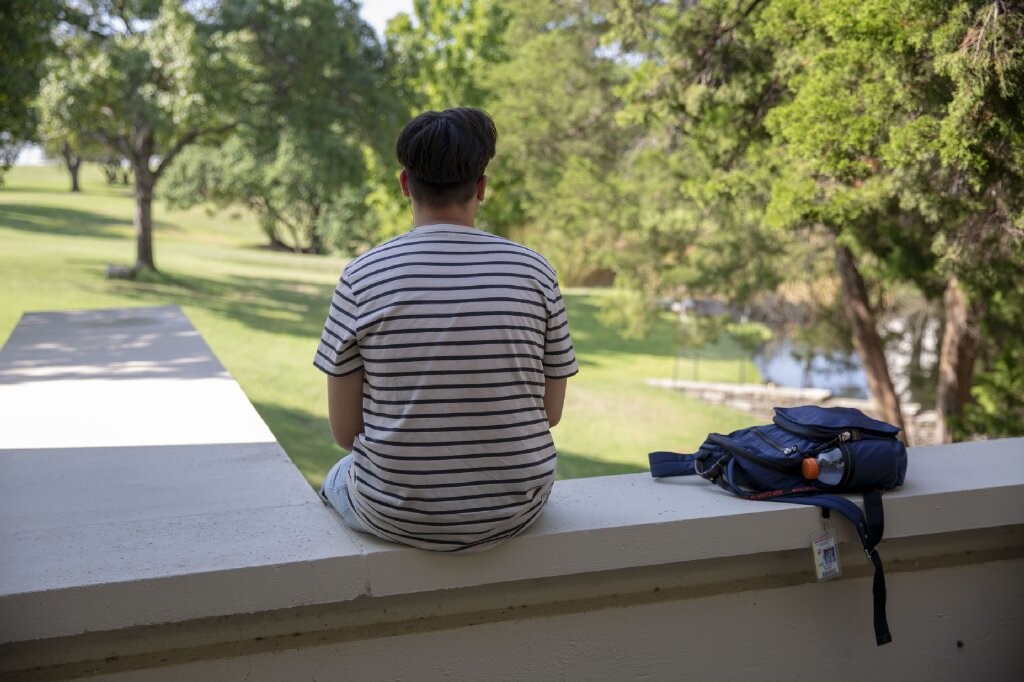Last updated on May 22, 2020
This material was written by a licensed counselor. All views expressed in this piece are their own and do not necessarily reflect the views of DCCCD.
It seems today that peace of mind has never been further away or harder to find!
Problems, difficulties, worries, fears — each day seems to bring more of these. Things seem so complicated, so hard to understand or figure out. Why do our minds keep racing, sometimes going over and over the same things? How can you ever find peace of mind when your mind is acting like a hamster addicted to his running wheel?
The ancient Hindus developed ways of relaxing the mind and body several thousand years ago, and their techniques have worked for millions of people through the years. They developed yoga to discipline the body, to help it find and maintain a sense of calm while gaining strength. In addition, the Hindus developed meditation to help the mind find a place of calm and stay there for a while, learning how to return to that state when needed.
Meditation is basically a way to find quiet and stillness in the midst of a chaotic and rushing world. It slows down and soothes your mind and body so you can truly find rest. Then, you can really be restored and renewed. People who meditate regularly discover that they have more energy, better health and less anxiety. Ancient yoga began as a way of physical meditation.
The term “mindfulness” is an attitude or approach to life, and meditation is a powerful tool that can help you get there. It is about being aware of your thoughts, feelings and body in a way that accepts and takes care of those parts of you and helps you to be whole and healthy.
In the midst of a challenging pandemic, how great would it be to use this period of your life to get in touch with yourself, to better understand what you need, to pay more attention to what is going on inside you? Imagine avoiding the grinding mental wear and tear — and instead taking better care of yourself.
Sounds good, right?
So, how do you do that, and where do you get started? Fortunately, you do not need expensive equipment or lessons! You do need a guide, and there are plenty of these available for free.
The essence of mindfulness is simplicity — so be wary of complicated or expensive programs. It can be gentle or rigorous, a few minutes a day or a longer amount of time. It is best when done daily and when it is a lifestyle, not a quick cure. Here are some free apps (for Apple/Android) and videos to help you get started on your self-care journey.
- A nice app for mindfulness (introduces basics, lots of topics): Smiling Mind
- An app that teaches meditation, then has a wide variety of topics: Medito
- Also, if you like visual aids, search YouTube for: “short guided meditations”
- And if you want to get physically grounded, search YouTube for: “beginners’ yoga”
Begin the journey to finding your inner peace!
DCCCD Online Counseling for Students
Safe and secure mental health counseling sessions are now available for currently enrolled students through a virtual meeting platform called Webex.
Interested in scheduling an online counseling appointment? To get started, contact your campus Counseling Center at the email address listed below.
- Brookhaven Counseling Center: bhccounseling@dcccd.edu
- Cedar Valley Counseling Center: cvccounseling@dcccd.edu
- Eastfield Counseling Center: jasminegarcia@dcccd.edu
- El Centro Counseling Center: ECCStudentCounseling@dcccd.edu
- Mountain View Counseling Center: jgonzalez@dcccd.edu
- North Lake Counseling Center: nlccounseling@dcccd.edu
- Richland Counseling Center: Counseling-RLC@dcccd.edu
From there, a member of your campus Counseling Center team will provide you a link to complete and submit your intake and consent forms. Please allow yourself about 15-20 minutes to complete them online. After submitting the forms, you will be able to schedule an appointment with a counselor.
When you schedule an appointment, a member of the Counseling Center team will email you a Webex calendar invite with the time and date for your session. Please click on the unique link in the calendar invite to join by video, or call the number provided to speak with the counselor by phone at the scheduled time.
Please note: If you are experiencing a mental health crisis, please call 911 or visit the nearest hospital emergency room rather than requesting an online counseling session.
Community Mental Health Resources
If you feel the need to speak to someone outside the district, please explore the many community mental health resources available in our area:
- North Texas Behavioral Health Authority can help pay for community psychiatric, mental health and substance abuse services — please call 214-366-9407.
- Suicide and Crisis Center of North Texas — please call 214-828-1000.
- National Veterans Crisis Line — please call 800-273-8255 and press 1 when prompted.
- National Domestic Violence Hotline —please call 800-799-7233.
- National Sexual Assault Hotline — please call 800-656-4673.
- Message 741741 from anywhere in the United States to text with a trained crisis counselor. Heads up — standard messaging rates may apply.
It’s okay to say. If you see something that could be helpful to someone else, spread the word and share this information. Even if you’re not dealing with a specific mental health issue, chances are someone you know is.
